Economic Green Shoots Torpedoed by Chrysler Bankruptcy
Stock-Markets / Financial Markets 2009 May 14, 2009 - 06:31 PM GMT More Americans than forecast filed unemployment-insurance claims last week because of the Chrysler LLC bankruptcy that is likely to reverberate through the economy for months.
More Americans than forecast filed unemployment-insurance claims last week because of the Chrysler LLC bankruptcy that is likely to reverberate through the economy for months.
Initial jobless claims rose by 32,000 to 637,000 in the week ended May 9, the Labor Department said today in Washington. A good part of the jump was from states reporting an increase in auto-related claims, a Labor official said without providing a more precise estimate. The department also said that wholesale prices rose in April, spurred by a gain in food costs.
Easy credit (not the free market) causes bad investment decisions.
The recession or depression is the necessary, if unfortunate, correction process by which the malinvestments of the boom period, having at last been brought to light, are finally liquidated. The diversion of resources into unsustainable investments out of conformity with consumer desires and resource availability comes to an end, with businesses failing and investment projects abandoned. Although painful for many people, the recession/depression phase of the cycle is not where the damage is done. The bust is the period in which the economy sloughs off the malinvestments and the capital misallocation, re-establishes the structure of production along sustainable lines, and restores itself to health. The damage is done during the boom phase, the period of false prosperity that precedes the bust. It is then that the artificial lowering of interest rates causes the squandering of capital and the initiation of unsustainable investments. It is then that resources that would genuinely have satisfied consumer demand are diverted into projects that make sense only in light of the temporary and artificial conditions of the boom.
Nine weeks of gains...is there more?
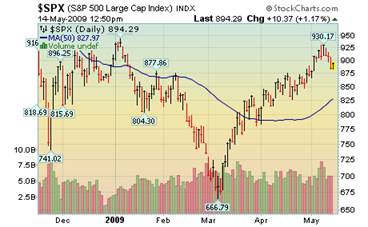 -- U.S. stocks advanced, snapping a three-day losing streak for the Standard & Poor’s 500 Index, as a decrease in bank borrowing costs overshadowed an increase in jobless claims. “The last few weeks, expectations got a little ahead of themselves,” said Dean Gulis, part of a group that manages about $2.5 billion for Loomis Sayles & Co. in Bloomfield Hills, Michigan. “We’re just in a period of consolidation at least, given the extraordinary move we’ve had since early March off the bottom.”
-- U.S. stocks advanced, snapping a three-day losing streak for the Standard & Poor’s 500 Index, as a decrease in bank borrowing costs overshadowed an increase in jobless claims. “The last few weeks, expectations got a little ahead of themselves,” said Dean Gulis, part of a group that manages about $2.5 billion for Loomis Sayles & Co. in Bloomfield Hills, Michigan. “We’re just in a period of consolidation at least, given the extraordinary move we’ve had since early March off the bottom.”
Treasury bonds rebound on “flight to safety”and Fed buying.
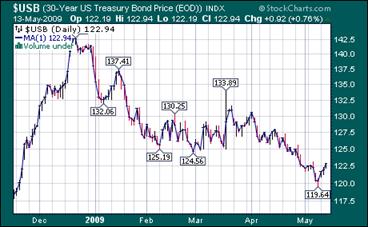 -- The Federal Reserve bought $2.975 billion of Treasuries as part of the central bank’s effort to reduce lending rates and lift the world’s largest economy out of recession. The Fed considers the increase in Treasury yields since the program began more as a reflection of a better economic outlook than a signal it needs to step up purchases of U.S. government debt, according to central bank officials who declined to be identified yesterday. It is interesting to see the timing of the purchase matched the decline in stocks. Liquidity, anyone?
-- The Federal Reserve bought $2.975 billion of Treasuries as part of the central bank’s effort to reduce lending rates and lift the world’s largest economy out of recession. The Fed considers the increase in Treasury yields since the program began more as a reflection of a better economic outlook than a signal it needs to step up purchases of U.S. government debt, according to central bank officials who declined to be identified yesterday. It is interesting to see the timing of the purchase matched the decline in stocks. Liquidity, anyone?
Gold is gaining.
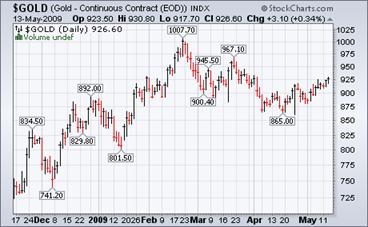 Gold rose in New York, erasing an earlier drop, as investment demand for the metal strengthened after reports showed a gain in U.S. producer prices and a rise in initial claims for jobless benefits. A separate report showed prices paid to U.S. producers rose in April, paced by a 1.5 percent increase in consumer foods, pushing back the risk of deflation taking root in the economy.
Gold rose in New York, erasing an earlier drop, as investment demand for the metal strengthened after reports showed a gain in U.S. producer prices and a rise in initial claims for jobless benefits. A separate report showed prices paid to U.S. producers rose in April, paced by a 1.5 percent increase in consumer foods, pushing back the risk of deflation taking root in the economy.
Japanese stocks slumped on U.S. retail sales.
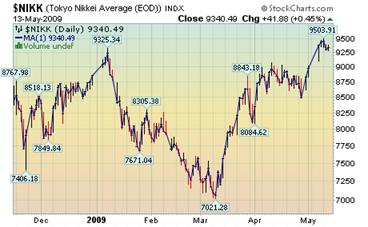 -- Japanese stocks fell, sending the Topix index to its sharpest drop in six weeks, after U.S. retail sales unexpectedly declined and the yen strengthened, clouding the earnings outlook for makers of cars and electronics.
-- Japanese stocks fell, sending the Topix index to its sharpest drop in six weeks, after U.S. retail sales unexpectedly declined and the yen strengthened, clouding the earnings outlook for makers of cars and electronics.
Toyota Motor Corp., the world’s biggest automaker, retreated 4.1 percent, while Sony Corp., which gets a quarter of its sales from the U.S., lost 6.8 percent.
Chinese stock buyers overestimated the recovery.
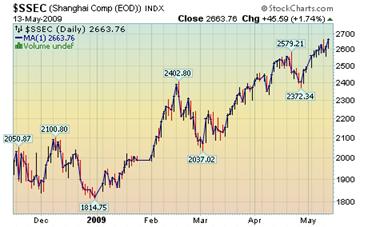 -- The Shanghai Composite Index, fell from the highest level in nine months as U.S. retail sales unexpectedly declined, commodity prices slumped and new ship orders plunged. “Overseas demand is still weak and the global economy isn’t recovering as quickly as expected,” said Yan Ji, who helps oversee $850 million of investments at HSBC Jintrust Fund Management Co. in Shanghai.
-- The Shanghai Composite Index, fell from the highest level in nine months as U.S. retail sales unexpectedly declined, commodity prices slumped and new ship orders plunged. “Overseas demand is still weak and the global economy isn’t recovering as quickly as expected,” said Yan Ji, who helps oversee $850 million of investments at HSBC Jintrust Fund Management Co. in Shanghai.
Will the “green shoot rally” prevail?
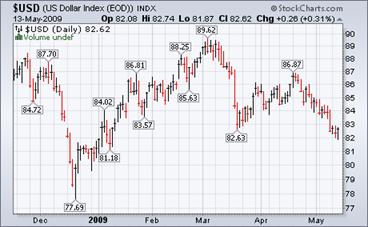 -- The dollar strengthened against the euro for a second day as a report showing U.S. jobless claims rose last week more than economists forecast and a drop in stocks spurred demand for a refuge. The decline in stocks is a driver in leading investors to the dollar as a safe haven. It’s too early to tell, but it appears that the dollar may be finished with its decline.
-- The dollar strengthened against the euro for a second day as a report showing U.S. jobless claims rose last week more than economists forecast and a drop in stocks spurred demand for a refuge. The decline in stocks is a driver in leading investors to the dollar as a safe haven. It’s too early to tell, but it appears that the dollar may be finished with its decline.
Housing prices down and going lower.
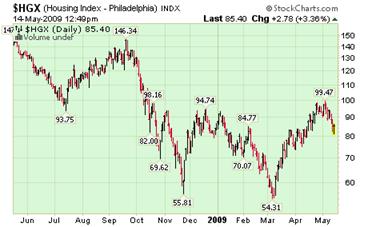 The median price for a single-family house fell 14% to $169,000 in the first quarter from a year earlier, the National Association of Realtors reported.
The median price for a single-family house fell 14% to $169,000 in the first quarter from a year earlier, the National Association of Realtors reported.
U.SThe median price for the latest quarter is down 26% from a peak of $227,600 in the third quarter of 2005. The latest median price was down from a year earlier in 134 of the 152 metro areas included in the survey.
Gasoline rising in anticipation of Summer driving.
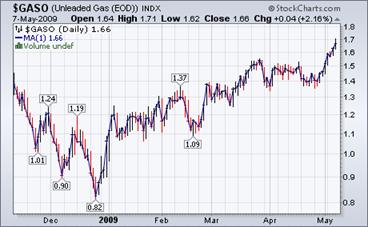 Energy Information Administration Weekly Report suggests that, “The national average price for regular gasoline surged more than 16 cents to $2.24 per gallon. Despite tallying the largest increase since September 15, 2008, the price was $1.48 less than a year ago and $1.87 below the all-time high set on July 7, 2008. Prices increased in every region of the country. On the East Coast, the price shot up 16 and a half cents to $2.21 per gallon. The average price in the Midwest gained the most of any region, jumping almost 21 cents to hit $2.26 per gallon.”
Energy Information Administration Weekly Report suggests that, “The national average price for regular gasoline surged more than 16 cents to $2.24 per gallon. Despite tallying the largest increase since September 15, 2008, the price was $1.48 less than a year ago and $1.87 below the all-time high set on July 7, 2008. Prices increased in every region of the country. On the East Coast, the price shot up 16 and a half cents to $2.21 per gallon. The average price in the Midwest gained the most of any region, jumping almost 21 cents to hit $2.26 per gallon.”
Economic downturn reflected in natural gas prices.
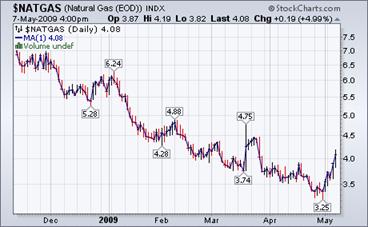 The Energy Information Agency’s Natural Gas Weekly Update reports, “Natural gas spot prices were up between 11 and 31 percent since last Wednesday, May 6, continuing the pattern of generally rising natural gas prices that began in trading on May 1 at most markets. Factors contributing to the rising natural gas prices likely included increased cooling demand for natural gas and rising crude oil prices. However, general macroeconomic conditions, including a weaker U.S. dollar and signs of an incipient recovery in the U.S. economy, appear to be playing a significant and perhaps a leading role in the recent run-up in natural gas prices.”
The Energy Information Agency’s Natural Gas Weekly Update reports, “Natural gas spot prices were up between 11 and 31 percent since last Wednesday, May 6, continuing the pattern of generally rising natural gas prices that began in trading on May 1 at most markets. Factors contributing to the rising natural gas prices likely included increased cooling demand for natural gas and rising crude oil prices. However, general macroeconomic conditions, including a weaker U.S. dollar and signs of an incipient recovery in the U.S. economy, appear to be playing a significant and perhaps a leading role in the recent run-up in natural gas prices.”
Was This a Sucker’s Rally?
Here’s an analysis of the market rally from the Wall Street Journal worth reading.
The Dow Jones Industrial Average has bounced an astounding 30% from its March 9 low of 6547. Is this the dawn of a new era? Are we off to the races again?
I'm not so sure. Only a fool predicts the stock market, so here I go. This sure smells to me like a sucker's rally. That's because there aren't sustainable, fundamental reasons for the market's continued rise. Here are three explanations for the short-term upswing:
- Armageddon is off the table.
- Zero yields.
- Bernanke’s printing press.
Our Investment Advisor Registration is on the Web .
We are in the process of updating our website at www.thepracticalinvestor.com to have more information on our services. Log on and click on Advisor Registration to get more details.
If you are a client or wish to become one, please make an appointment to discuss our investment strategies by calling Connie or Tony at (517) 699-1554, ext 10 or 11. Or e-mail us at tpi@thepracticalinvestor.com .
Anthony M. Cherniawski,
President and CIO
http://www.thepracticalinvestor.com
As a State Registered Investment Advisor, The Practical Investor (TPI) manages private client investment portfolios using a proprietary investment strategy created by Chief Investment Officer Tony Cherniawski. Throughout 2000-01, when many investors felt the pain of double digit market losses, TPI successfully navigated the choppy investment waters, creating a profit for our private investment clients. With a focus on preserving assets and capitalizing on opportunities, TPI clients benefited greatly from the TPI strategies, allowing them to stay on track with their life goals
Disclaimer: The content in this article is written for educational and informational purposes only. There is no offer or recommendation to buy or sell any security and no information contained here should be interpreted or construed as investment advice. Do you own due diligence as the information in this article is the opinion of Anthony M. Cherniawski and subject to change without notice.
Anthony M. Cherniawski Archive |
© 2005-2022 http://www.MarketOracle.co.uk - The Market Oracle is a FREE Daily Financial Markets Analysis & Forecasting online publication.



